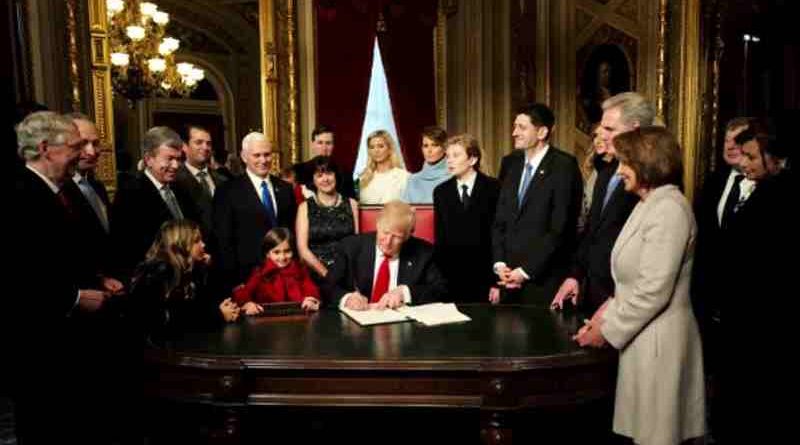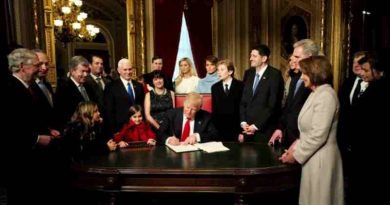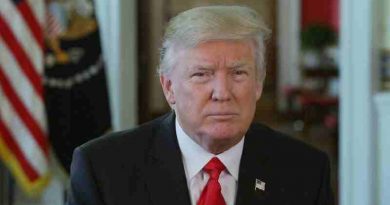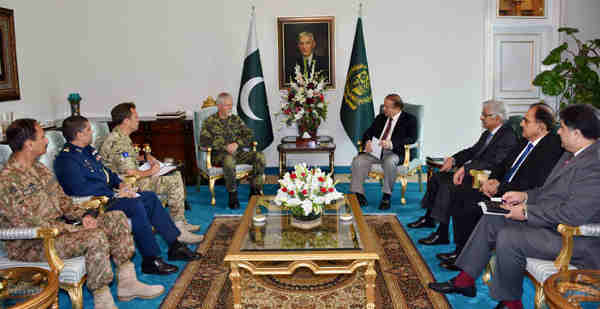President Trump Stops Afghan War, Taliban and U.S. Sign Peace Deal

The peace agreement is being seen as a victory for Pakistan which has always maintained that it has been weeding out terrorism from its soil and the neighboring areas.
By Rakesh Raman
After nearly 18 years of conflict, the Afghan militant organization Taliban and the U.S. signed a peace agreement today (February 29) in the Qatari capital of Doha.
President George W. Bush had ordered bombing of Taliban and toppled the Taliban leadership in response to the 9/11 (September 11, 2001) attacks on the U.S. Today’s agreement will pave the way for the withdrawal of U.S. troops and helped President Donald Trump fulfill his election promise of ending the war in Afghanistan. [Click here to read the joint declaration.]
The UN Secretary-General António Guterres has reiterated the importance of an inclusive Afghan-led peace process with the meaningful participation of women and youth. “To be durable, any settlement must uphold the human rights and fundamental freedoms of all citizens and safeguard the gains made on the human rights of women. The United Nations remains committed to supporting the Government and people of Afghanistan,” Mr Guterres said in a statement.
Similarly, NATO has also welcomed the peace agreement. “I welcome the announcement that an understanding has been reached on a significant reduction in violence across Afghanistan. This is a critical test of the Taliban’s willingness and ability to reduce violence, and contribute to peace in good faith,” said NATO Secretary General Jens Stoltenberg.
“This could pave the way for negotiations among Afghans, sustainable peace, and ensuring the country is never again a safe haven for terrorists,” Mr Stoltenberg added.
NATO Allies have been in Afghanistan since 2001. NATO currently has 16,000 troops in the country to support the Afghan security forces with training and funding, so that they can create the conditions for peace.
PAKISTAN’S ROLE IN THE PEACE PROCESS
As Pakistan Prime Minister (PM) Imran Khan has played an important role in bringing the two sides to the negotiation table, Pakistan’s Foreign Minister Shah Mahmood Qureshi was among the representatives of 50 countries that participated in the agreement signing event.
The peace agreement is being seen as a victory for Pakistan which has always maintained that it has been weeding out terrorism from its soil and the neighboring areas. Special Representative for Afghanistan Reconciliation at the U.S. State Department Zalmay Khalilzad has acknowledged Pakistan’s positive role in the peace process. President Trump had also welcomed Imran Khan as the go-between for the peace talks.
Thanks to @POTUS Trump’s leadership, we are finally making substantial progress toward ending our nation’s longest war. Today’s release of the Joint Declaration between Afghanistan and the U.S. marks a pivotal moment in the #AfghanPeaceProcess. #ForAfghanistan #WeAreNATO pic.twitter.com/pWjgiUv6mj
— Department of Defense 🇺🇸 (@DeptofDefense) February 29, 2020
The U.S. Department of Defense today thanked President Trump. “Thanks to President Trump’s leadership, we are finally making substantial progress toward ending our nation’s longest war. Today’s release of the Joint Declaration between Afghanistan and the U.S. marks a pivotal moment in the Afghan peace process,” the statement said.
Under the agreement, the U.S. agrees to vacate the region by mid-2021 and bring down its forces to 8,600 from 13,000 in the next 3-4 months. The complete pullout will depend on the Taliban fulfilling its commitments to stop terrorism.
After losing tens of thousands of lives and spending more than $750 billion, the Trump Administration has finally put an end to the violent conflict in Afghanistan. The decision will help Trump in his presidential campaign, as most Americans do not want the U.S. to have its military presence in other countries.
The leaders of Taliban had ruled Afghanistan and harbored Osama bin Laden and his al-Qaida network that had hijacked 4 airliners that were crashed into lower Manhattan, the Pentagon, and a field in western Pennsylvania, killing almost 3,000 people.
By Rakesh Raman, who is a national award-winning journalist and social activist. He is the founder of a humanitarian organization RMN Foundation which is working in diverse areas to help the disadvantaged and distressed people in the society. He also creates and publishes a number of digital publications and research reports on different subjects.






